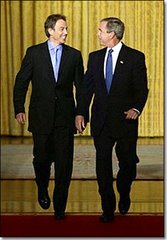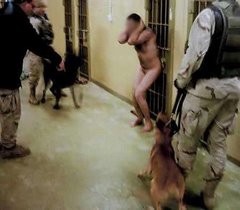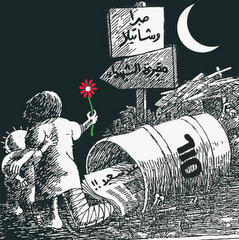
By Adi Schwartz, Haaretz Correspondent
http://www.haaretz.com/hasen/spages/1011861.html
Tags: Georgia, Russia
Exactly 40 years ago, on a hot August day in 1968, Alexander Dubcek stood looking out his office window as thousands of Soviet soldiers poured into his city, Prague. The First Secretary of the Communist Party of Czechoslovakia and the architect of the "Prague Spring" knew it was only a matter of time until he heard a knock on the door.
In his memoir, "Hope Dies Last," Dubcek wrote, "The main door flew open again, and in walked some higher officers of the KGB, including a highly decorated, very short colonel. The little colonel quickly reeled off a list of all Czechoslovak Communist Party officials present and told us that he was taking us 'under his protection.' Indeed we were protected, sitting around that table - each of us had a tommy gun pointed at the back of his head."
Two days later, Dubcek was taken to the Kremlin, where then Soviet president Leonid Brezhnev explained the prevailing reality to him and cut short the democratic reforms by thumping his fist on the table. Dubcek was sent back to his country, where he spent the next 20 years as a forester in a remote region of Slovakia.
Advertisement
At least for now, Georgian President Mikheil Saakashvili is being spared that fate. He is still the ruler of the small Caucasian state. The outcome of this week's events, however, could prove quite similar to the drama of 40 years ago. The Soviet oppression of Czechoslovakia showed the whole world that the U.S.S.R. would not tolerate democratic adventures within its sphere of influence. The Soviet Union made it clear to Eastern Europe that the West, including the United States, would not lift a finger as Soviet tanks crushed a small sovereign state. The defeat of the Prague Spring truncated a wave of openness and democratization that had washed over both Eastern and Western Europe in the late 1960s.
The two decades that have passed since the fall of the Iron Curtain can now be divided in two. The first 10 years, dubbed the "end of history" by U.S. political philosopher Francis Fukuyama, lasted from 1989 until September 11, 2001, and were characterized by unflappable optimism. The cold war made way for globalization. The Western model trumped all available alternatives. The U.S. became the world's sole superpower, with unchallenged military, diplomatic and economic hegemony. China was taking baby steps toward a free-market economy and Russia was getting its first tastes of democracy.
Then came the terror attack against New York's World Trade Center. Suddenly it turned out that not everyone wanted to join the McDonald's and laptop festivals. The failed U.S. wars in Afghanistan and Iraq caused a deep rift in the Western camp. Russia, which felt severely humiliated over the loss of Eastern Europe and the 15 republics that had made up the Soviet Union, switched gears. Under the scepter of former KGB officer Vladimir Putin, Russia reverted to tricks that were thought forgotten, such as poisoning the Ukrainian president or eliminating journalists and potential political rivals. Instead of human rights, a free-market economy and democracy, we got nationalizations, the imprisoning of rebellious oligarchs and tight supervision of the press.
'History is returning'
This week's events in Georgia are the most obvious manifestation of that shift. On Wednesday, U.S. Secretary of State Condoleezza Rice said, with inelegant tardiness, that Washington will not allow Georgia to fall, as it did with Czechoslovakia in 1968. President George W. Bush, for his part, promised humanitarian aid and even delayed his vacation "for a day or two, at least," but for now the American response looks hesitant and anemic.
For the first time in 30 years, Russia has initiated a war beyond its borders. For the first time in 20 years, an elected democratic regime is being threatened by force. For the first time in 20 years, the West is standing exposed and helpless, with its stock exchanges, galloping euro, flourishing economy and highfalutin talk of human rights. The planes and tanks in Georgia have returned to Russia its status of superpower.
In a twist on Fukuyama's "end of history" hypothesis, former Israeli ambassador to Washington Itamar Rabinovich asserted that this week it seemed as though "history is returning in a big way, and America has to cope with a new reality." According to Rabinovich, "The Russians' power play succeeded and is likely to have a great many implications."
The most immediate change will be felt in the Caucasus, a region of utmost strategic and economic importance for both Russia and the West. Dr. Brenda Shaffer, an expert on the Caucasus from Haifa University, explains that the region's natural gas reserves are even more important than its oil. "It is too late to be talking about oil as a global weapon," she says. "In Israel and around the world people still think in terms of the energy crisis of the 1970s, but oil is a fluid that can be transported relatively easily. Oil can be purchased from Russia today, from Norway tomorrow and from Saudi Arabia next week. Gas, on the other hand, must be supplied via pipelines that cost billions of dollars to build. Gas pipelines must pass through several countries and are extremely dependent on local political conditions."
Shaffer notes that in the past few years, European countries have been trying to develop direct supply lines from Central Asian states holding large natural gas reserves. Europe's growing dependency on Russian oil and gas spurred the continent's efforts to find alternatives, which is irritating Russia. "Natural gas, which the Europeans find very attractive because it is more environmentally friendly than oil, has so far traveled from Central Asia to Europe only via Russia," continues Shaffer. "Of course oil also has its problems: The fact that a Sukhoi SU-25 fighter jet 'almost' hit the oil pipeline running from the Caspian Sea to the Mediterranean Sea is interesting. The SU-25 is a very sophisticated plane that could easily have bombed the pipeline. Indeed, this doesn't seem like a miss but more like a message to the West: Don't mess with us."
This means that Europe is becoming increasingly dependent on Russia for energy. "Massive projects have been planned in recent years," says Shaffer, "such as the Nabucco Pipeline, to bring Central Asia's natural gas by way of the Caspian Sea and Georgia to the Mediterranean. We can forget about that project now. Russia has made that very clear. Russia did not invade Kazakhstan, but rather a small country that is a bottleneck between Central Asia and the West. No one will want to take the risk of angering the Russians again."
Beginnings of a new world order?
But Russia's message is not merely economic. "Several regimes in this region are wondering about where they are headed," says Shaffer. "America's blatant abandonment of its best friend in the region, President Saakashvili, will certainly prompt a policy reevaluation in countries like Azerbaijan, Kazakhstan and Turkmenistan. If until now these states were certain that it was in their best interest to befriend the Americans - and we saw how they responded to the war in Afghanistan - now they may think it more worthwhile to befriend Iran or Russia. Maybe these two states can protect them where the Americans have failed. From the point of view of U.S. foreign policy, this conclusion has very negative repercussions. The Russian invasion of Georgia exposed the Europeans and Americans' bluff, and left the Georgians on their own. I would even go so far as to say that maybe the presidents of Afghanistan and Iraq are already considering their next steps." This week's unprecedented support for Saakashvili by the presidents of Poland, Ukraine, Lithuania and Estonia indicates that the picture extends beyond the Caucasus. Alexander Rahr, a member of Germany's Council on Foreign Relations and author of a biography of Vladimir Putin, believes this marks the beginning of a new world order. "Bush's legacy is a foreign policy disaster," says Rahr. "The dream of democratizing the Middle East has been shattered. As his final months in office approached, he was at least trying to bring Ukraine and Georgia closer to NATO, and now that won't happen. He tried to install missiles in the Czech Republic and in Poland, and that won't happen either. It turns out that American influence has its limits, and that Russia has regained a sphere of influence. This is no longer the Russia of the 1990s, beaten and bruised, unable to act on behalf of its own interests. Russia is now in a position to respond, and that is exactly what it did.
"A very similar crisis could develop in the Crimean peninsula, which now belongs to Ukraine, but used to belong to Russia, and has a large Russian population. Now everyone realizes that the Russians are serious. The same thing could also happen in Azerbaijan. Public opinion in those countries could change - from pro-Western to not wanting to rankle the Russian neighbor." Rahr also feels this week's events could affect a possible military campaign against Iran, too. "America's space for maneuver has shrunk," he says, "both strategically and logistically. Now it will be much harder for America to operate in Russia's southern part. Diplomatically, too, Russia's voice will increasingly be heard."
Twilight of U.S. hegemony
The roaring of the Russian artillery near Tbilisi, which clearly revealed that the issue was not South Ossetia but rather Russia's status in the world, also prompted a reevaluation by Sovietologists and Russian historians.
"This is without a doubt a founding moment," says Anne Applebaum, a historian and author of the international best-seller "Gulag: A History." "This week the Russians set an example. Just like when they killed journalist Anna Politkovskaya. There is no need to kill all the country's journalists. One is enough, and all the rest get the message. That's what [Russia] did this week: There is no need to invade all the countries in the region, but they will all get the message.
"In recent years we have seen a deterioration in the human rights situation in Russia," Applebaum continues. "Now it is clear that rising Russian nationalism will extend beyond the country's borders. This week's events also made it clear that the belief that only the U.S. can flex its muscles is mistaken. They marked the end of an era in which the U.S. behaved like the only superpower. It was interesting to follow the events on a split-screen television, showing both the amazing spectacle China organized for the opening of the Olympic Games and pictures from Georgia. We saw two new superpowers, evincing different behavior, of course, but which completely undermine America's global hegemony. We saw history in the making, right before our eyes."
Historian Simon Sebag-Montefiore, author of two biographies of Josef Stalin, believes this is "the start of the twilight of America's sole world hegemony.
"The retaking of Ossetia is a minor part of the Russian campaign," says Montefiore, who has visited Georgia many times and is personally acquainted with the three presidents who have headed the country since the Soviet Union's disintegration. "More significant is the attack on Georgia proper, which reasserts Russia's hegemony over the Caucasus and defies American superpowerdom.
"The prospect of encirclement by triumphant America infuriated Russia," he continues. "Imagine if newly independent Wales joined the Warsaw Pact. This war is really a celebration of ferocious force in the realm of international power, a dangerous precedent. Russia has demonstrated the limits of U.S. power and Moscow's historic destiny as regional and world superpower. The Empire has struck back and shaken the order of the world."













No comments:
Post a Comment